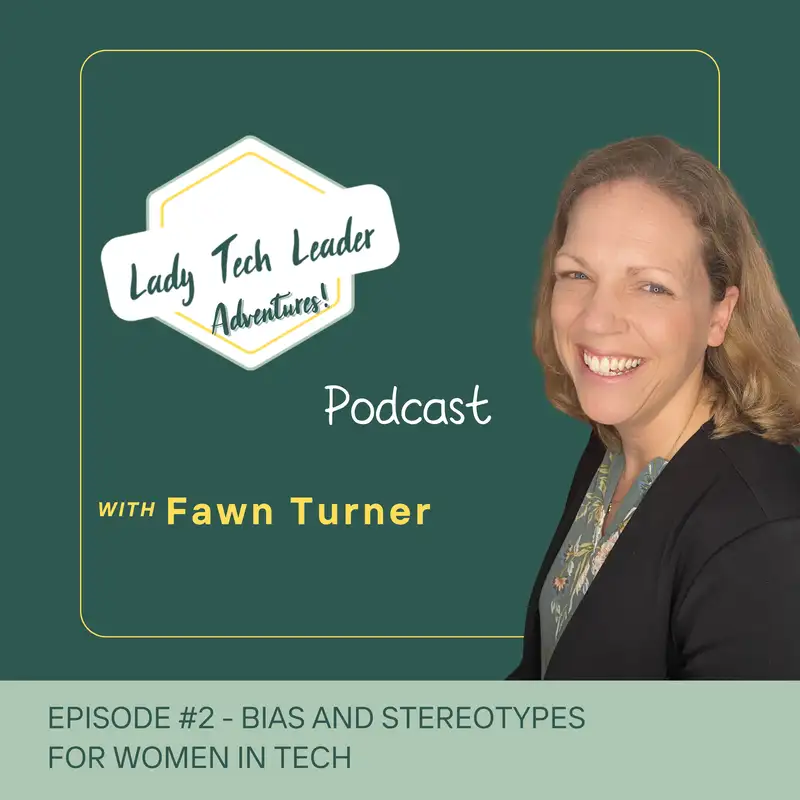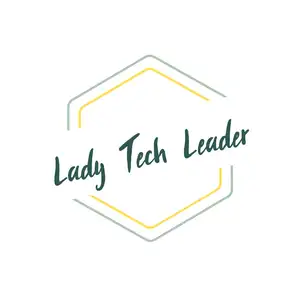Lady Tech Leader Adventures #2
Fawn Turner [00:00:01]:
Hi there. Welcome to Lady Tech Leader Adventures, the podcast that empowers and elevates women in technology through insightful discussions, inspiring stories, and actionable advice. I'm Fawn Turner, your host and founder of Lady Tech Leader. We are dedicated to helping women become influential leaders and achieve fulfilling careers in tech. Join us as we explore the journeys of trailblazing women and uncover key leadership strategies while sharing the tools you need to lead and succeed in the ever evolving tech landscape. Let's dive into today's episode and unlock the leader within you. Hello. This is your advocate, Fawn, and we're addressing a critical issue today, overcoming gender bias and stereotypes in tech.
Fawn Turner [00:00:52]:
Let's explore the challenges and effective strategies to overcome these barriers. 1st, you have to understand the challenges. Gender bias and stereotypes in tech manifest in various forms from subtle exclusions in meetings to overt discrimination. This often forces many women to feel they must repeatedly prove their worth, a pressure not equally shared by their male counterparts. Recognizing these bias biases is the first step, whether it's being overlooked for leadership roles due to assumptions about capabilities or future life choices, such as family planning. When I was a tech lead, I tried to get a unique assignment where I would be a consultant with a partner organization, which in theory was supported by my company. However, I was told with a young family, I wouldn't be the right fit for that job. I had already addressed that concern up front because my husband and I knew the opportunity and the impact.
Fawn Turner [00:01:48]:
However, that shouldn't have been the decision of the management chain without talking to me before I could even start the process of exploring the opportunity. There may have been other factors that were not shared with me, although saying it was because of my family left me wondering, what if? Secondly, it's important to have strategies to navigate and overcome those biases and stereotypes. Overcoming these challenges begins with awareness but requires actionable strategies on your part. An effective approach could be assertiveness training, which involves being clear about your achievements and advocating for yourself. It's crucial to build a support network connecting with other like minded individuals and women in tech through forums, networks, or groups. These platforms not only provide support, but they can also help share strategies that have been effective for others. Finding support networks was not something that came easy for me personally. Women in tech are usually reserved and not necessarily willing to reach out to each other without a reason or opportunity.
Fawn Turner [00:03:04]:
I, myself, was a bit standoffish from other women in tech early in my career. Other than my close friends, it wasn't until a specific event triggered me to build a tight knit network of women at work. It was after I became pregnant that I started having more vulnerable deep connection conversations with a few women at work. Men just didn't get me anymore, or rather, I didn't get their comments to me. They were off putting. It was a trigger to really build deeper connections to those women and tech at work, not because of the pregnancy, but it was a catalyst to help me realize that we are very unique and different, and we experience life completely different in a completely different way than men in tech. I realized that I had missed many years of opportunity to build a network of women before that. Opportunity to build a network of women before that.
Fawn Turner [00:04:03]:
Thirdly, institutional change and personal actions. While personal actions are critical, institutional change is equally important. Companies need to implement unbiased hiring and promotion processes and provide training to recognize and combat unconscious biases. Mentorship programs and sponsorships can significantly enhance gender parity, helping women advance and ensuring that they are considered for leadership roles on an equal footing. I was told I wasn't technical enough for years after getting a master's in engineering. It was deflating every time I heard it. I addressed this personally by networking and finding a matrixed assignment where I was valued. And the manager or a team lead was willing to give me glowing technical reviews back to my home organization.
Fawn Turner [00:04:58]:
A little different perspective to my manager was extremely helpful to my performance review when that was no longer an excuse within that specific department. However, remember, different parts of your organization prioritize different things, and you are being compared to your direct peers. If you're being evaluated against young single employees who work 80 plus hours a week and you have a family you need to leave at 5 PM every day to see, that is the lens that you are being evaluated against. So make sure your management chain has a little different perspective given feedback from others. You don't necessarily have to leave your organization to do that, or your specific team to do that, but that was finding a matrix team was really something that helped me, in my journey. So to all the women who are listening to this, remember, you are really not alone in this journey. And by raising awareness, advocating for systematic changes, and supporting each other, we can begin to dismantle these barriers. It's not just something that our leadership in our organizations have to do, although that's important.
Fawn Turner [00:06:16]:
Making sure that we are being curious and standing up to these types of behaviors certainly can make a change as well. Up next is our women to know, where we are featuring Grace Hopper today. So this is our section of the podcast where we celebrate women to know. Some in tech, some not in tech. Today, we're focusing on a towering figure in computing, Grace Hopper. Her innovations not only transform technology, but also pave the way for women in this field. Let's explore her groundbreaking contributions and enduring legacy. I will be reading an essay that my daughter, Mara, wrote about her.
Fawn Turner [00:07:00]:
A big shout out, and thank you to Mara for sharing your research with all of us. Grace Brewster, Marie Hopper. Have you ever heard about Grace Brewster, Marie Hopper? She was a scientist and a naval officer. This essay is about Grace's life as a child, her life as a young adult, and her life as an adult. I hope this inspires you to not be limited because of who you are. Whether you're a child, man, or woman, nothing can stop you. Admiral Grace Hopper was born on December 9, 1906 in New York, New York. As a child, Grace Brewster Marie Hopper went to school at Hartridge Plainfield, New Jersey.
Fawn Turner [00:07:41]:
Grace had 2 siblings. Their names were Mary Marie Westcoat and doctor Roger Franklin Murray the second. At an incredibly early age, Grace Hopper was taking apart her household items and reassembling them. Her curiosity would lead her to getting recognized by the executive branch, which includes the president, the vice president, and the cabinet. A few of Grace's hobbies were needlepoint, reading, and playing the piano. Grace Hopper was the oldest 1 of the 3 kids and was named after her mother's best friend, Grace Brewster. At the age of 18, Grace Hopper was enrolled in Vassar College. Grace Hopper received college student degrees in mathematics and physics from Vassar in 1928 after Grace Hopper began attending Yale, the school her father used to attend.
Fawn Turner [00:08:32]:
At Yale, Grace studied under Howard Engstrom, a discoverer in computers. Grace Hopper earned a master's degree on 19 in 1930 and a PhD in mathematics in 1934. In the year 1930, Grace Hopper married Vincent Hopper at the age of 23. Vincent Hopper was an English instructor instructor at New York School of Commerce. Then 15 years after the marriage, Vincent passed away. Grace Hopper had many professions. She was a computer programmer, a computer scientist, a mathematician, a physicist, a higher education teacher, and a naval officer. Grace Hopper became a naval officer after the bombing of Pearl Harbor and wanted to join in the war effort.
Fawn Turner [00:09:24]:
Grace Hopper tried many times to get into the US Naval Reserve, but she was rejected because of her age and size. Grace Hopper was a persistent woman and soon was given a waiver to join the US Naval Reserve. At the age of 85, Grace Hopper died in her sleep on January 1, 1992 in her home at Arlington County, Virginia. This essay went over Grace Hopper's life as a child, her life as a young adult, and her life as an adult. I hope this essay inspired you to always be yourself and to look to a better future for you and your family. Grace Hopper was not limited to just her gender, so she went beyond what others thought of, what women should or could do. I hope Grace Bruce and Ray Hopper inspired you to be who you are and never to change that. Thank you, Mara.
Fawn Turner [00:10:14]:
Grace Hopper's legacy is not just in the software that still runs our world, but in the vibrant, inclusive tech culture she helped to foster. She taught us to be fearless, to take risks, and to understand that 1 person with a great idea can indeed change the world. Remember Grace's words. The most dangerous phrase in the language is, we've always done it this way. Break barriers and innovate. Next episode, we will delve into building technical credibility in tech. That change starts with us. Thank you for tuning into the Lady Tech Career Adventures.
Fawn Turner [00:10:58]:
I hope today's episode has inspired you to push boundaries and elevate your career in technology. Remember, leadership is a journey, and you are not alone. For more insights and resources, including a community of strong tech ladies, go to lady tech leader.com. And don't forget to subscribe to our podcast for more stories and strategies that empower women in tech. Until next time, keep leading, keep learning, and continue to make a difference. Goodbye.

